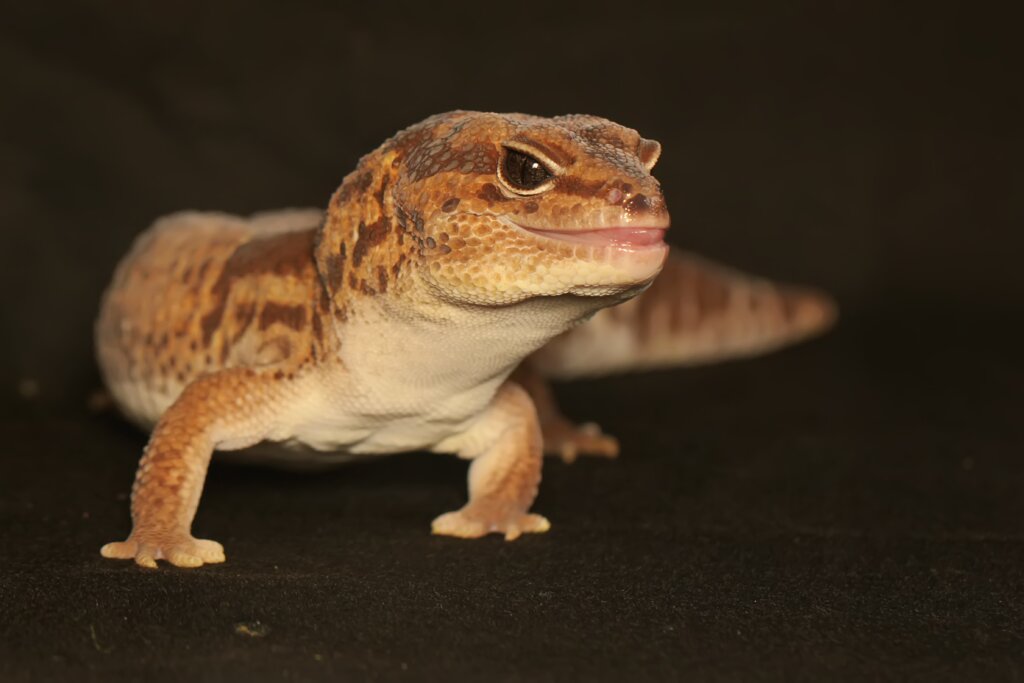Salmonella Linked to Geckos

The Centers for Disease Control and Prevention (CDC) announced that the investigation into the multistate occurrence of human Salmonella Muenchen infections is linked to contact with pet geckos.
As of May 12, a total of fourteen people from eleven states (WA, CA, KS, IL, MI, OH, PA, VA, LA) have been reported to be infected with Salmonella Muenchen. To date there has only been one hospitalization and no deaths. The illness started on dates ranging from December 2024 to April 2025.
The true number of people who have been sick may be higher because many people recover without medical care and are not tested for Salmonella. Additionally, recent illnesses may not be yet reported, as it typically takes between 3 and 4 weeks to determine if a sick person is part of any outbreak.
Contact most frequently occurs in people’s homes and includes touching animals or their enclosures, feeding them and putting them on their lap, head, or shoulders.
The ages of those infected range from less than one year to 80 years, with a median age of 19 years. When state and local public health officials interviewing those who were sick asked about what animals they encountered the week before they became sick, 60% reported contact with a gecko before becoming ill. Of six patients providing information about the types of geckos they had contact with, four reported contact with crested geckos, three reported contact with leopard geckos, one reported contact with a Malaysian cat gecko, and one reported contact with an African fat-tailed gecko.
People in this outbreak have reported purchasing geckos at multiple retail locations.
Most people infected with Salmonella develop diarrhea, fever and abdominal cramps between six hours and six days after infection. The illness usually lasts four to seven days, and most individuals recover without treatment. Children under the age of five, seniors , and individuals with weakened immune systems have a greater risk of infection and complications.
Animals become infected with Salmonella through their environment, by eating contaminated food, or from their mothers before they are born or hatched. Regardless of where they are purchased, many animals can carry Salmonella and still appear healthy and clean. Animals with Salmonella shed bacteria in their stool which can contaminate their body parts or items in their habitat, such as bedding, food, or water. People can be infected if they do not wash their hands after contact with animals carrying Salmonella or their environment.
The CDC, Pet Advocacy Network and other expert sources recommend these precautions to protect yourself and others from contact with Salmonella bacteria that reptiles, including geckos, may carry:
Wash your hands with soap and water:
- After handling your gecko
- After feeding your gecko or handling its food
- After cleaning your gecko’s cage or enrichment materials or handling or gecko’s poop
- Before eating or drinking
Play Safely:
- Children under 5 years old should not handle or touch reptiles, amphibians, or their environments because they are at a higher risk for serious illness and hospitalization caused by Salmonella.
Do not cross-contaminate:
- Keep geckos and their habitats out of the kitchen or anywhere food is prepared, stored, served, or eaten. Do not allow geckos to roam freely throughout a home or living space. Supervise your gecko when outside of its habitat to prevent accidents and contamination.
Safely clean your gecko’s habitat:
- Clean your gecko’s habitat and enrichment items outside of the house, if possible. These items may include feeders, toys, food, and water containers.
- If you must clean inside, do not clean any items in the kitchen or areas where food is prepared or eaten. Use a laundry sink or bathtub and thoroughly clean and disinfect the area right after.
- Pour any water from your gecko’s enclosure down the toilet rather than down sinks or drains.
Pick the right pet for your family:
Geckos and other food reptiles are not recommended for children younger than five, adults older than sixty-five and anyone with a weakened immune system. These people are more likely to get a serious illness from germs that reptiles can carry.
Pet retailers are strongly encouraged to provide information on disease risk and prevention measures to consumers purchasing pets, and to employees handling these companion animals. Such information includes the “Healthy Herp Handling” poster, which can be found listed in the resources below.
Resources
- CDC Investigation Update: https://www.cdc.gov/salmonella/outbreaks/muenchen-03-25/investigation.html
- CDC Initial Investigation Notice: Salmonella Outbreak Linked to Geckos | Salmonella Infection | CDC
- CDC information on diseases and prevention for reptile owners: https://www.cdc.gov/healthypets/pets/reptiles.html
- CDC Stay Healthy Around Pet Reptiles and Amphibians poster: https://www.cdc.gov/healthypets/resources/safety-around-reptiles-H.pdf
- CDC information on safe handling of reptiles and amphibians: https://www.cdc.gov/healthypets/pets/reptiles/safe-handling.html
- CDC information on Salmonella : https://www.cdc.gov/salmonella/
- Pet Advocacy Network flyer containing information on Salmonella for retailers and owners: https://petadvocacy.org/wp-content/uploads/2022/02/Zoonotic_Prevention-Flyer-Salmonellosis.pdf
- Pet Advocacy Network Disease Prevention: Healthy Herp Handling poster: https://petadvocacy.org/zoonotic-disease-prevention
- Pet Advocacy Network health alerts on zoonotic diseases: https://petadvocacy.org/newsroom/health-alerts
- CDC information on outbreaks of zoonotic diseases spread between animals and humans in the United States: https://www.cdc.gov/healthypets/outbreaks.html
- CDC information on Salmonella : https://www.cdc.gov/salmonella/
- Pet Advocacy Network flyer containing information on Salmonella for retailers and owners: https://petadvocacy.org/wp-content/uploads/2022/02/Zoonotic_Prevention-Flyer-Salmonellosis.pdf
- Pet Advocacy Network Disease Prevention: Healthy Herp Handling poster: https://petadvocacy.org/zoonotic-disease-prevention
- Pet Advocacy Network health alerts on zoonotic diseases: https://petadvocacy.org/newsroom/health-alerts
- CDC information on outbreaks of zoonotic diseases spread between animals and humans in the United States: https://www.cdc.gov/healthypets/outbreaks.html